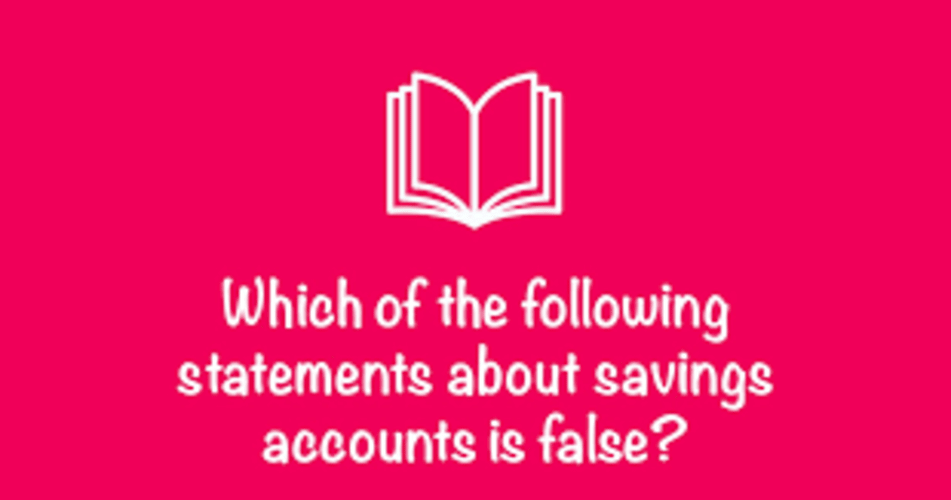Which of the Following Statements about Savings Accounts is False?
– Savings accounts limit the number of withdrawals that can be made each month.
– Savings accounts may require you to maintain a minimum balance to avoid paying a fee.
– Savings accounts are best used to store money for longer-term goals.
Savings accounts don’t usually pay interest on the money you deposit.
An interest bearing deposit account held at a bank or other financial institution is called a Savings account. This account is a good option for parking cash that you want available for short term needs, though saving accounts pay only a modest interest and also their safety and reliability makes them a good option.
There are limitations attached to savings account and that is on often you can withdraw funds, but generally, exceptional flexibility are offered by savings account and that is ideal for a short- term goal like buying a land or going on vacation or simply sweeping surplus cash you don’t need in your checking account so it can earn a little interest.
Read Also;
How a Savings Account Works.
Financial institutions use savings and deposits accounts as sources of funds that they use for loans. You can virtually find savings accounts in every bank or credit union, be it your traditional banks or virtual banks. You can also find savings accounts at some investment and brokerage firms.
Interest rates for Savings accounts vary. Banks and credit unions might change their rates at any time with the exception of promotions promising a fixed rate until a certain date. Interestingly, the more competitive a rate is, the likelihood of it fluctuating is pretty high.
Institutions will adjust their deposit rates when there is a change in the federal funds rate. Significant higher interest rates for larger minimum deposits are offered to high-yield savings accounts which may be worth looking into.
A minimum balance is required by some conventional savings accounts to avoid monthly fees or earn the highest published rate, while others have no balance requirement. Try and know the rules of your particular account to avoid giving out your earnings to fees.
Money from your account can be transferred in or out of your saving account online, at a branch or ATM, by electronic transfer or direct deposit.
Some banks peg their withdrawal limit to six per month. That requirement was set by the Federal Reserve as a requirement for savings account but in April, 2020 withdrew it. If you withdraw more than six times with some banks, you will be charged a fee, your account may be closed, or be converted to a checking account. The amount one can withdraw is limited to the account is in the account.
The interest earned on savings accounts is taxable income just as with the interest earned on a money market, certificate of deposit, or checking account.
You will be sent a 1099-INT by your financial institution where you hold your account whenever you earn more than $10 in interest income. Your marginal tax rate determines the tax you will pay.
Pros of Savings Account
- It is fast and quite easy to set up, to love money to and from.
- Your primary account can be conveniently linked to your savings account
- Your full balance in your savings account can be withdrawn anytime.
- In a case of bank failure, up to $250,000 is insured.
Cons of Savings Account
- You earn less interest than you would with certificates of deposit, treasury bills, or investments.
- With easy access, withdrawals can be tempting.
- There are minimum balance required in some saving accounts.
